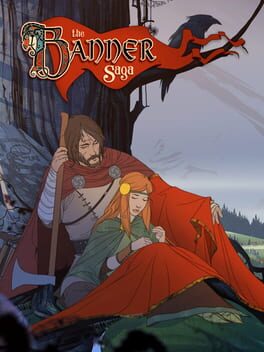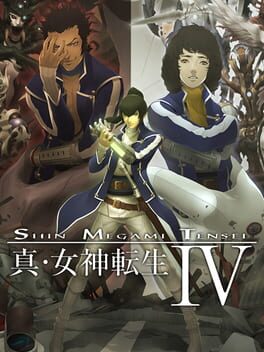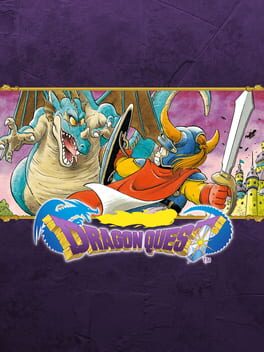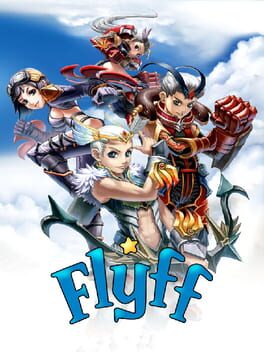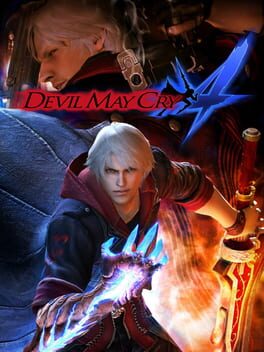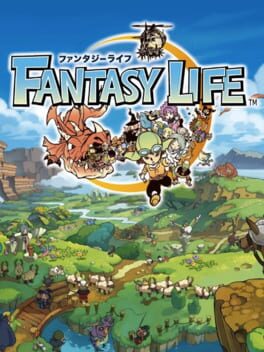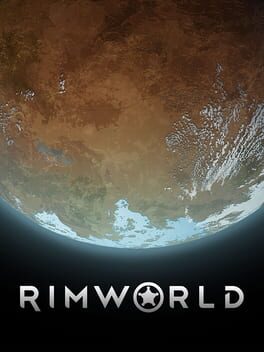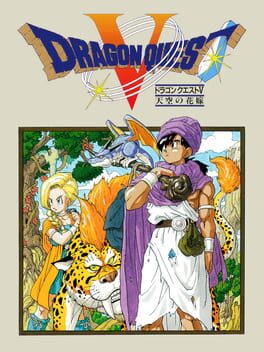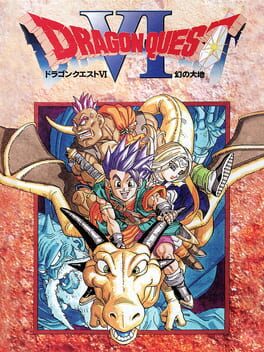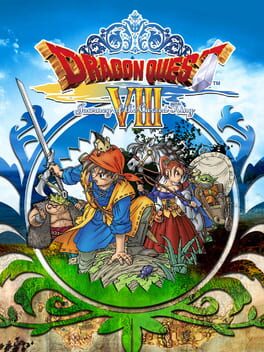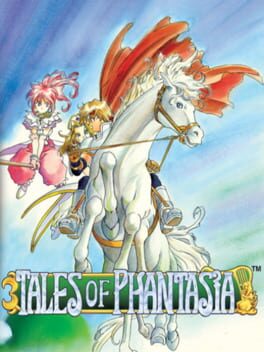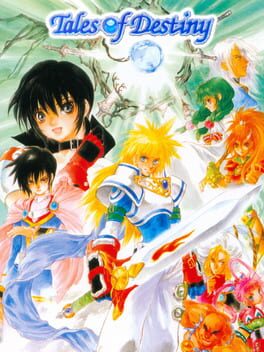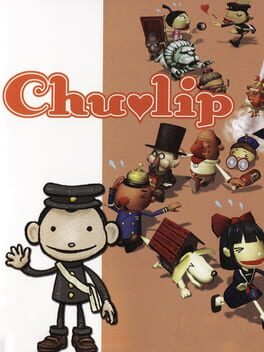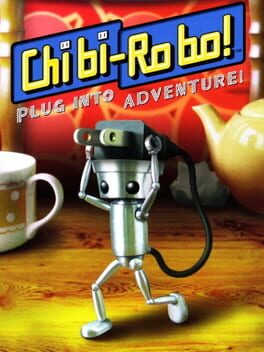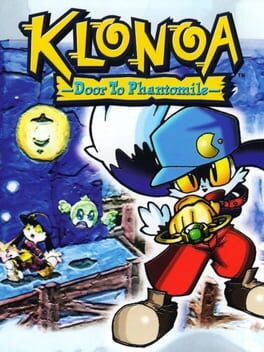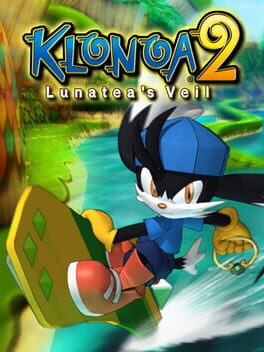perrydimes
12 reviews liked by perrydimes
The Banner Saga
2014
Banner Saga was an entry point for me to its genre of turn based tactics and managing a small army, but I had no issue with quickly understanding and being invested in all of its systems. And it was a great experience, excellently intertwining its gameplay and narrative to immerse me in its tale of fighting desperately for whatever it is you value as the world comes to an end.
The star of its gameplay is the armor/health system, where all units have 2 health bars that each have unique properties. Armor gives a flat reduction to regular damage, making high armor enemies immune to almost anything you throw at them until you chip it away. All units can do specifically anti-armor attacks instead, doing a much smaller amount of damage directly to it, but this is necessary to be able to later do significant damage to high armor enemies. Where it really shines though is that every unit's health is also its attack damage. So it's not only a decision of how to most efficiently kill an enemy, but when you can weave in direct damage so that it will be less dangerous. Doing some small chip damage to an enemies' health might be less efficient than armor damage to kill it, but can prevent it from getting an attack through the armor of one of your units. These decisions become all the more meaningful with later enemies that have huge amounts of health and armor, where you'll have to chip away huge amounts of armor, but for as long as you don't do direct damage, they can one-shot your units. This also puts an exceptional value on a few abilities that can do direct damage ignoring armor entirely.
This is in addition to all of the vital strategy of positioning. Units normally can't move through each other, and many powerful abilities have limited fixed ranges. This makes some clever positioning and manipulation of enemy move and attack ranges able to make your damage much more efficient, force enemies to attack your tanks, or even skip their turns entirely.
This natural depth to the combat made me excited and engaged in every single fight. There isn't a ton of variety in enemies and enemy abilities, only at the end of the game do we get a few more complex ones that I might've expected, like enemies with passive buffs to their fellows until you kill them, and spells that do damage over time. But I didn't mind that most fights are against the same relatively simple enemies, because the depth of the gameplay is in its basic systems, such that there's a lot of meaningful decision making even fighting just big stat sticks. At normal difficulty you do have a comfortable margin for error, but I'd be interested in a replay on hard to be forced to play as efficiently as possible.
I've went this far without mentioning the story, which certainly bears mentioning. It tells a story of two races, men and Varl, a race of huge, long lived ox men. Although previously in conflict, they've come together in the face of worldwide calamity, from an incursion of a race of violent stone skinned creatures, and more mysterious and celestial signs of the end times. The main character perspective changes intermittently, giving you the points of view of both men and Varl.
It's this use of perspective that was the most engaging part of Banner Saga for me. The most main protagonist is Rook, a man who's inherited the responsibility of leading a village of hundreds of peasants on a journey through desolate mountains and the crumbling remnants of civilization, now inhabited by vultures looking to pick you for scraps, and beset by monsters that far exceed your human stature.
These parts of the game give an immense immersion of Rook's desperation, your caravan is just barely holding on by a thread, every risk needs to be calculated, but you won't be able to survive without large risks. This is impressed on you by the gameplay, with your team of largely vulnerable archers, facing down and defeating hulking brutes that can club your head in with one swing, through the cooperation and ingenuity of mankind. It's also impressed on you by the out of combat decision making, as you're faced with constant dilemmas--do you take these men with you, or leave them to die, when they'll take more food and might betray you? How do you settle disputes within your caravan to maintain order and resources, while still maintaining morale? Do you risk going through enemy territory, or take the long way, losing precious time and food? I felt the game was constantly calling attention to Rook's character, what is he really fighting for? What is he willing to sacrifice? I felt the weight of his life, and those of everyone he was protecting hang in the balance for all of these choices.
Compared to the intimacy and palpable mortality of Rook's story, the perspective of the Varl is distinctly different. Armed with the confidence and wisdom of hundreds of years of life, they feel much more detached. Many of the Varl have isolated themselves, living in small communities in the far north. You feel that solemnity in the historian Ubin, who may be the oldest living Varl, and even in the great warrior Hakon. They react to the impending apocalypse with more of a grim resignation. You particularly sense this in the immense value they put on historical landmarks and achievements of their forefathers. In the vast scope of their lives, men will live and die quickly, but a monument that stands for centuries is far more meaningful.
I haven't yet started the second and third games as of writing this, but I'm excited to. Banner Saga is an excellently cohesive experience that I'd recommend to almost anyone.
The star of its gameplay is the armor/health system, where all units have 2 health bars that each have unique properties. Armor gives a flat reduction to regular damage, making high armor enemies immune to almost anything you throw at them until you chip it away. All units can do specifically anti-armor attacks instead, doing a much smaller amount of damage directly to it, but this is necessary to be able to later do significant damage to high armor enemies. Where it really shines though is that every unit's health is also its attack damage. So it's not only a decision of how to most efficiently kill an enemy, but when you can weave in direct damage so that it will be less dangerous. Doing some small chip damage to an enemies' health might be less efficient than armor damage to kill it, but can prevent it from getting an attack through the armor of one of your units. These decisions become all the more meaningful with later enemies that have huge amounts of health and armor, where you'll have to chip away huge amounts of armor, but for as long as you don't do direct damage, they can one-shot your units. This also puts an exceptional value on a few abilities that can do direct damage ignoring armor entirely.
This is in addition to all of the vital strategy of positioning. Units normally can't move through each other, and many powerful abilities have limited fixed ranges. This makes some clever positioning and manipulation of enemy move and attack ranges able to make your damage much more efficient, force enemies to attack your tanks, or even skip their turns entirely.
This natural depth to the combat made me excited and engaged in every single fight. There isn't a ton of variety in enemies and enemy abilities, only at the end of the game do we get a few more complex ones that I might've expected, like enemies with passive buffs to their fellows until you kill them, and spells that do damage over time. But I didn't mind that most fights are against the same relatively simple enemies, because the depth of the gameplay is in its basic systems, such that there's a lot of meaningful decision making even fighting just big stat sticks. At normal difficulty you do have a comfortable margin for error, but I'd be interested in a replay on hard to be forced to play as efficiently as possible.
I've went this far without mentioning the story, which certainly bears mentioning. It tells a story of two races, men and Varl, a race of huge, long lived ox men. Although previously in conflict, they've come together in the face of worldwide calamity, from an incursion of a race of violent stone skinned creatures, and more mysterious and celestial signs of the end times. The main character perspective changes intermittently, giving you the points of view of both men and Varl.
It's this use of perspective that was the most engaging part of Banner Saga for me. The most main protagonist is Rook, a man who's inherited the responsibility of leading a village of hundreds of peasants on a journey through desolate mountains and the crumbling remnants of civilization, now inhabited by vultures looking to pick you for scraps, and beset by monsters that far exceed your human stature.
These parts of the game give an immense immersion of Rook's desperation, your caravan is just barely holding on by a thread, every risk needs to be calculated, but you won't be able to survive without large risks. This is impressed on you by the gameplay, with your team of largely vulnerable archers, facing down and defeating hulking brutes that can club your head in with one swing, through the cooperation and ingenuity of mankind. It's also impressed on you by the out of combat decision making, as you're faced with constant dilemmas--do you take these men with you, or leave them to die, when they'll take more food and might betray you? How do you settle disputes within your caravan to maintain order and resources, while still maintaining morale? Do you risk going through enemy territory, or take the long way, losing precious time and food? I felt the game was constantly calling attention to Rook's character, what is he really fighting for? What is he willing to sacrifice? I felt the weight of his life, and those of everyone he was protecting hang in the balance for all of these choices.
Compared to the intimacy and palpable mortality of Rook's story, the perspective of the Varl is distinctly different. Armed with the confidence and wisdom of hundreds of years of life, they feel much more detached. Many of the Varl have isolated themselves, living in small communities in the far north. You feel that solemnity in the historian Ubin, who may be the oldest living Varl, and even in the great warrior Hakon. They react to the impending apocalypse with more of a grim resignation. You particularly sense this in the immense value they put on historical landmarks and achievements of their forefathers. In the vast scope of their lives, men will live and die quickly, but a monument that stands for centuries is far more meaningful.
I haven't yet started the second and third games as of writing this, but I'm excited to. Banner Saga is an excellently cohesive experience that I'd recommend to almost anyone.
SMTIV is a game about history.
You're thrown into a medieval world that just feels off. Why are there Samurai in European medieval armor guarding European-style castle walls? Why does everyone have Western names, despite being Japanese? Why do they call Japanese writing the "mystic script"? What's up with Burroughs, an AI that lives in a certain device but is called a spirit by the locals? Why does the Aquila statue say that we are in the Gregorian year of 1453? The Gregorian calendar is our calendar, so this must take place 500 years ago, but this is impossible, there wasn't any AI back then, this doesn't make any sense. Is this the past then? Why are there demons that are treated as something that's part of everyday life? The game presents itself as a riddle: Here's this elaborate and functoning society, but something is off. Figure out how it happened, where it came from and why it looks like this.
The opening act is the strongest of the game. If the game is not interesting to you in this beginning act, it never willl be. What the game is trying to do is not getting to you and not resonating with you. You can stop playing now.
The fun of the opening act is trying to piece together all of the clues the game throws at you about the world and what happened to it, it's encouraging you to make theories about how everything came to be, to write a history of the world in your head from the information you gather as you explore it, to find context and explaination for why everything is the way it is. SMTIV tries to show that without knowledge of history, and the context of the world you live in, you cannot understand anything that is around you, and as a result you are helpless, naive and easily manipulated by authorities around you, as you have no choice but to follow their interpretation of the world. As you continue through the game and uncover the history of the world and how Mikado came to be, how Tokyo came to be, how its societies come to be, as you continously revise your theories about what happened to the world to get to this point through the information you find, the more empowered you become, the more in charge of your own destiny you become, the less manipulated by others you become. By the end, once you understand the truth of the history of the world, you also gain the power to decide the future or the world, but by this point you've finally emancipated enough and informed enough to have the right to make that decision. You earned being an SMT protagonist.
SMTIV's world-building is fantastic and by far its greatest strength, and it's the single aspect that makes this game phenomenal. IV never gives you a huge lore dump to explain everything around you, or a true history of the world and all the events that lead up to it. You have to figure out everything on your own, and connect the dots between the bits of pieces of information given to you. Everything is in the game, albeit sometimes only hinted at, but if you pay attention, you can figure everything out. But this only works because the world around you is so logically and thoughtfully constructed that you can actually use the machinations of either Mikado or Tokyo to figure out how they came to be. "Kichijoji" was bastardized into "Kichigiorgi", it's never outright stated, but simply noticable. The status of the samurai in Mikado is somewhat strange, albeit fully logical, and entirely tied to the "gauntlet". The already mentioned Gregorian calendar is a great early hint towards the true nature of Mikado. Infernal Tokyo finally reveals why demons eat humans, thus, why the red pills exist. Couple that with Stephen's explaination for demons you can also figure out the effect of red pills on humans.
It's clear SMTIV was built on an extremely strong foundation - Kaneko's script - and they meticulously attempted to implement the world Kaneko created into the game, to create a consistent experience and to allow wildly different parts of the game that are unrecognizable from one another like Mikado and infernal Tokyo to both contribute to the player's quest in figuring out the history of the world.
SMTIV's main theme and what it was designed around is that you live in a post-SMT world. Like SMT2, which IV takes an unfortunate amount of inspiration from, someone already made a decision. Someone already chose between chaos and neutral at one point, someone already sat at the crossroads of the world and decided where it should be heading You, the player, have to deal with the consequences of the save file of the previous player, Akira, and examine its consequences and decide how to proceed. You have four options - white, law, chaos and neutral - and the game goes out of its way to show that they are valid interpretations of the events that are occurring and occurred in the past. The law alignment has Mikado and the ashura-kai to convince you of its merits, the Chaos alignment has the gaia clan and various demons giving you interesting and original speeches to convince you, neutral is achieved only by being convinced both law and chaos are correct in different instances, and white is when you don't see a point in choosing.
What makes SMTIV fascinating and truly great is how its storytelling structure allows a surprising amount of interaction from the player, not just through the decisions you can make, but by presenting itself as a riddle that never hits you over the head with what happened or what is going on, it gives the player a lot of agency and a lot to do mentally speaking. You can explore on your own, put the hints together on your own, and get the gears in your brain working, you can check out this or that sidequest and talk to this or that NPC, which all act as further hints and evidence for past events. It feels rewarding and like an accomplishment when you figure out what fits together. I personally especially loved the moment I realized the meaning behind NPC account of a coccoon taking children in Shinjuku. No one tells you "we did that, then we went there, and in order to do that...". It's just something you can see and figure out on your own. SMTIV puts the player into the role of the historian, you're made to look for fragmented evidence of the past, and create a coherent story that makes them fit together.
The game also does a great job immersing you into the character you are playing. Tokyo is confusing to navigate, but it naturally would have been for someone who has never set foot in Tokyo before, and slowly getting to know the place after being completely confused and stumbling into random places trying to advance feels annoying at first, but can feel satisfying once you mastered it. Picking up relics and loot off corpses and buildings feels realistic, and many of the quests feel like you are doing things that people in the world actually need and is a genuine service to the world of SMTIV, further immersing you into the role as a "hunter".
Now that we have analyzed the game, we can finally figure out what the game was going for. Give the player agency in multiple ways. First, make the player feel empowered and self-determined by making them figure out and understand the history of the world around them on their own, this allows the player to feel a sense of agency, which is fantastic and difficult to achieve in a JRPG without many choices. Second, build on top of that agency that was achieved through its cryptic storytelling style by allowing them the typical SMT choice about the fate of the world, which only enhances the sense of agency provided by the game. In short, SMTIV's story is not brilliant, but the way it is told and structured is perfect for the video game medium, as it is tailor-made to give agency to the player and make exploration and questing something that feels player-driven, and not game-driven.
The music in SMTIV is phenomenal and my absolute favorite OST of any game ever. I will NEVER forget the moment I stepped into Ueno for the first time. The Ueno theme so perfectly captures the melancholic shock of discovering Tokyos underground station societies but also its cozy safety from the dangers that lurk above, and the relief and shelter it provides. The music is the game's second greatest strength - it enhances every scene, makes every boss fight much more hype than it deserves to be. It's really banger after banger. B2, ashura kai shop, the hunter association theme are absolutely amazing. The latter sounds so cyberpunk and exciting, the place is just a png but the music makes it feel so lively and busy. What a fantastic OST.
The gameplay is decent fun, press-turn is always at least a little bit entertaining, but the balance of the game is very off, with it being very easy past Medusa, the final bosses are jokes, demons aren't unique in their abilities, the Tokyo map is a nightmare to navigate, the art direction is iffy because the demon art from different eras of Kaneko clash with one another alongside with the guest designs. The game is very flawed, but what it does well it does amazingly, it's an engrossing, engaging experience that opens the eyes to the player to what potential SMT as an IP, as an idea really has. What a rich world it could provide, what a unique way of telling stories in JRPGs that are never seen in other JRPGs outside of maybe Dark Souls if you count that.
SMT deservedly sits in the shadow of Persona, but it doesn't have to be. It can be every bit as deep, engaging, memorable, exciting and stylish as any Persona. It doesn't have to be niche. It doesn't have to be nothing but a "hardcore JRPG dungeon crawling difficult combat" game. The next SMT game needs to be as ambitious as SMTIV, and come up with a new, unique storytelling style - like IV's about 'history' - and combine it with the gameplay improvements from V and IVA. If it can do that, if it can unleash the potential that sits in the IP, in the idea of "Shin Megami Tensei", it can be every bit as respected and loved as Persona is.
You're thrown into a medieval world that just feels off. Why are there Samurai in European medieval armor guarding European-style castle walls? Why does everyone have Western names, despite being Japanese? Why do they call Japanese writing the "mystic script"? What's up with Burroughs, an AI that lives in a certain device but is called a spirit by the locals? Why does the Aquila statue say that we are in the Gregorian year of 1453? The Gregorian calendar is our calendar, so this must take place 500 years ago, but this is impossible, there wasn't any AI back then, this doesn't make any sense. Is this the past then? Why are there demons that are treated as something that's part of everyday life? The game presents itself as a riddle: Here's this elaborate and functoning society, but something is off. Figure out how it happened, where it came from and why it looks like this.
The opening act is the strongest of the game. If the game is not interesting to you in this beginning act, it never willl be. What the game is trying to do is not getting to you and not resonating with you. You can stop playing now.
The fun of the opening act is trying to piece together all of the clues the game throws at you about the world and what happened to it, it's encouraging you to make theories about how everything came to be, to write a history of the world in your head from the information you gather as you explore it, to find context and explaination for why everything is the way it is. SMTIV tries to show that without knowledge of history, and the context of the world you live in, you cannot understand anything that is around you, and as a result you are helpless, naive and easily manipulated by authorities around you, as you have no choice but to follow their interpretation of the world. As you continue through the game and uncover the history of the world and how Mikado came to be, how Tokyo came to be, how its societies come to be, as you continously revise your theories about what happened to the world to get to this point through the information you find, the more empowered you become, the more in charge of your own destiny you become, the less manipulated by others you become. By the end, once you understand the truth of the history of the world, you also gain the power to decide the future or the world, but by this point you've finally emancipated enough and informed enough to have the right to make that decision. You earned being an SMT protagonist.
SMTIV's world-building is fantastic and by far its greatest strength, and it's the single aspect that makes this game phenomenal. IV never gives you a huge lore dump to explain everything around you, or a true history of the world and all the events that lead up to it. You have to figure out everything on your own, and connect the dots between the bits of pieces of information given to you. Everything is in the game, albeit sometimes only hinted at, but if you pay attention, you can figure everything out. But this only works because the world around you is so logically and thoughtfully constructed that you can actually use the machinations of either Mikado or Tokyo to figure out how they came to be. "Kichijoji" was bastardized into "Kichigiorgi", it's never outright stated, but simply noticable. The status of the samurai in Mikado is somewhat strange, albeit fully logical, and entirely tied to the "gauntlet". The already mentioned Gregorian calendar is a great early hint towards the true nature of Mikado. Infernal Tokyo finally reveals why demons eat humans, thus, why the red pills exist. Couple that with Stephen's explaination for demons you can also figure out the effect of red pills on humans.
It's clear SMTIV was built on an extremely strong foundation - Kaneko's script - and they meticulously attempted to implement the world Kaneko created into the game, to create a consistent experience and to allow wildly different parts of the game that are unrecognizable from one another like Mikado and infernal Tokyo to both contribute to the player's quest in figuring out the history of the world.
SMTIV's main theme and what it was designed around is that you live in a post-SMT world. Like SMT2, which IV takes an unfortunate amount of inspiration from, someone already made a decision. Someone already chose between chaos and neutral at one point, someone already sat at the crossroads of the world and decided where it should be heading You, the player, have to deal with the consequences of the save file of the previous player, Akira, and examine its consequences and decide how to proceed. You have four options - white, law, chaos and neutral - and the game goes out of its way to show that they are valid interpretations of the events that are occurring and occurred in the past. The law alignment has Mikado and the ashura-kai to convince you of its merits, the Chaos alignment has the gaia clan and various demons giving you interesting and original speeches to convince you, neutral is achieved only by being convinced both law and chaos are correct in different instances, and white is when you don't see a point in choosing.
What makes SMTIV fascinating and truly great is how its storytelling structure allows a surprising amount of interaction from the player, not just through the decisions you can make, but by presenting itself as a riddle that never hits you over the head with what happened or what is going on, it gives the player a lot of agency and a lot to do mentally speaking. You can explore on your own, put the hints together on your own, and get the gears in your brain working, you can check out this or that sidequest and talk to this or that NPC, which all act as further hints and evidence for past events. It feels rewarding and like an accomplishment when you figure out what fits together. I personally especially loved the moment I realized the meaning behind NPC account of a coccoon taking children in Shinjuku. No one tells you "we did that, then we went there, and in order to do that...". It's just something you can see and figure out on your own. SMTIV puts the player into the role of the historian, you're made to look for fragmented evidence of the past, and create a coherent story that makes them fit together.
The game also does a great job immersing you into the character you are playing. Tokyo is confusing to navigate, but it naturally would have been for someone who has never set foot in Tokyo before, and slowly getting to know the place after being completely confused and stumbling into random places trying to advance feels annoying at first, but can feel satisfying once you mastered it. Picking up relics and loot off corpses and buildings feels realistic, and many of the quests feel like you are doing things that people in the world actually need and is a genuine service to the world of SMTIV, further immersing you into the role as a "hunter".
Now that we have analyzed the game, we can finally figure out what the game was going for. Give the player agency in multiple ways. First, make the player feel empowered and self-determined by making them figure out and understand the history of the world around them on their own, this allows the player to feel a sense of agency, which is fantastic and difficult to achieve in a JRPG without many choices. Second, build on top of that agency that was achieved through its cryptic storytelling style by allowing them the typical SMT choice about the fate of the world, which only enhances the sense of agency provided by the game. In short, SMTIV's story is not brilliant, but the way it is told and structured is perfect for the video game medium, as it is tailor-made to give agency to the player and make exploration and questing something that feels player-driven, and not game-driven.
The music in SMTIV is phenomenal and my absolute favorite OST of any game ever. I will NEVER forget the moment I stepped into Ueno for the first time. The Ueno theme so perfectly captures the melancholic shock of discovering Tokyos underground station societies but also its cozy safety from the dangers that lurk above, and the relief and shelter it provides. The music is the game's second greatest strength - it enhances every scene, makes every boss fight much more hype than it deserves to be. It's really banger after banger. B2, ashura kai shop, the hunter association theme are absolutely amazing. The latter sounds so cyberpunk and exciting, the place is just a png but the music makes it feel so lively and busy. What a fantastic OST.
The gameplay is decent fun, press-turn is always at least a little bit entertaining, but the balance of the game is very off, with it being very easy past Medusa, the final bosses are jokes, demons aren't unique in their abilities, the Tokyo map is a nightmare to navigate, the art direction is iffy because the demon art from different eras of Kaneko clash with one another alongside with the guest designs. The game is very flawed, but what it does well it does amazingly, it's an engrossing, engaging experience that opens the eyes to the player to what potential SMT as an IP, as an idea really has. What a rich world it could provide, what a unique way of telling stories in JRPGs that are never seen in other JRPGs outside of maybe Dark Souls if you count that.
SMT deservedly sits in the shadow of Persona, but it doesn't have to be. It can be every bit as deep, engaging, memorable, exciting and stylish as any Persona. It doesn't have to be niche. It doesn't have to be nothing but a "hardcore JRPG dungeon crawling difficult combat" game. The next SMT game needs to be as ambitious as SMTIV, and come up with a new, unique storytelling style - like IV's about 'history' - and combine it with the gameplay improvements from V and IVA. If it can do that, if it can unleash the potential that sits in the IP, in the idea of "Shin Megami Tensei", it can be every bit as respected and loved as Persona is.
Dragon Quest
2004
The NES is a console that I've time and time again kinda dismissed as a platform full of archaic design and games that have aged terribly all over the place, and yet, I keep finding myself returning to the system regardless, and it's for stuff like Dragon Warrior that I do this for. I honestly went into this expecting the worst, a cryptic grindfest full of unfocused ideas with too much ambition to properly fit on such primitive hardware, and while the game definitely was a lot of this to some extent, what I got was something pleasantly surprising. Now I won't say this has necessarily aged gracefully by any stretch of the imagination, it was the starting point for JRPGS as a whole after all, so it was all a bit of a learning process, but at the same time, this is such a well realised artistic vision that I can't help but be impressed at the same time with how much I actually enjoyed this and what a strong starting point this style of game had.
I think a huge reason for this is that the game manages to feel both ambitious yet also extremely restrained in what it has going on. There are very few items, certain things feel very streamlined, such as buying equipment instantly having the strongest option equipped and selling the piece it replaced, and having a small selection of spells that are fairly obvious to understand what they do. There feels like there's a fair amount to the game in terms of its scope, but at the same time, almost every aspect of it feels intentionally simplified in such a way to be as digestible as possible, which is appreciated for a lot of reasons. The biggest one to me is that due to this intention to make a game that can be easily understood for the most part, there's way less cryptic nonsense than one would think to the point where a guide is barely necessary, with ample hints and avenues to figuring out how to obtain what you need to beat the game, at least once you start to understand the way the game generally operates and works. Despite this simplicity however, in terms of atmosphere and general vibes, this honestly works really well at creating the sense of adventure set in an inhospitable land.
I respect how the game just starts off, gives you a very quick and basic rundown of your goal "rescue the princess and defeat the dragonlord" and then sets you out on a journey without much direction, having the player just explore the land and figure a lot of things out for themselves. While this easily could have led to a game that you'd be required to take a walkthrough with you every step of the way, Dragon Warrior leads the player pretty nicely for the most part through a combination of vague hints and directions and through expecting the player to thoroughly look into everywhere they can go and figure when it's time to go back into uncharted territory. The game doesn't hold your hand but doesn't make you feel hopelessly lost either, you can go anywhere from the start, the only thing stopping you is the fact that enemies are of varying strengths, so if you get destroyed, chances are you just need to look somewhere else for a bit and come back stronger. The idea of having crossing bridges on the overworld being the indicator for a jump in difficulty is pretty clever as well, both signalling the player of some key information while also not feeling totally out of place.
Despite the limited overworld sprites, there also felt like there was a lot of effort put into making the world feel alive, with each town having its own important parts to them while also feeling aesthetically different from one another. To further add to this is the way the NPCs are cleverly a mix of useless but often funny dialogue to make the towns feel lived in, while also often giving vital pieces of information that are just clear enough for it to feel more like a puzzle to figure out what the game wants from you, rather than another signal to look something up online. One of my favourite examples of this is the way that the final boss takes 1 damage from anything other than the ultimate sword, so to telegraph this in game, you've got one NPC who says "The Dragonlord's scales are as strong as steel" and then another one later who says that this ultimate sword can easily cut through steel. It's stuff like this that I find clever in that it's conveyed in a slightly higher order way than simply telling the player exactly what to do, while also not keeping it entirely hidden and borderline impossible to figure out on your own, and this sort of storytelling and instruction is used throughout the game as well, often requiring you to put a few bits of information together to get the full picture.
I also feel like the artwork in general goes a long way in making this feel appealing, thanks to Akira Toriyama's monster designs being super appealing to look at and giving some very clear and cohesive visual direction to the game that makes you a bit excited every time you're able to see yet another fun enemy. The issues of limited inventory size also feels somewhat mitigated thanks to the way there are barely any actual items, so there'll basically never be a point where you'll have too many and feel like you need to pointlessly micromanage, but also, the way that spells work in this further contributing to needing very few consumables. When the spells you get from levelling up don't directly contribute to dealing a lot of damage or some other vital combat utility, these often will have the same effect as one of the consumables in the game. This essentially means that after certain level ups, you no longer require dedicating a slot to said item, making things a constant process of streamlining your own inventory in a pretty seamless and satisfying way. I also think it's a nice touch how from the very start of the game you get a clear sight of the final destination and ultimate goal of the game, with everything being dedicated to working your way towards it, providing both a sense of cohesion and a strong driving force towards your goal, it being in sight but always out of reach. This is made all the more powerful by the way that they really make you feel like the world's against you, not only having monsters after your throat at all times basically, but even having the townsfolk express little faith in you, saying that they believe that the Dragonlord is far too powerful and other statements in the same vein.
While I've had a lot of positive things to say about this, Dragon Warrior is also far from a perfect game either, in fact, in some ways it's borderline painful to play. A lot of these issues come down to enemies as well, as despite how awesome they look, there's also a lot of frustration associated with them. The one that is most irritating is the way that while these spike in difficulty might result in a world that somewhat immerses you in the fact that it feels overrun by evil, it also means grinding, and quite a bit of it. I'd hazard a guess that most of the time spent playing this game was dedicated to grinding, and while this at first wasn't anything too bad, there being a certain relaxing quality to hacking away at things for a bit while playing some music in the background, it definitely hits a point where things begin feeling very tedious. This is exacerbated by a terrible EXP curve that sees the player hitting a point near the end of the game where they'll be needing around 3000 EXP per level where the average enemy at that point yields around 50, which I'm sure is pretty easy to see, it's kinda ridiculous and a real test of patience and kills some pacing especially near the end. Further adding to my grievances with the monsters is the encounter rate being painfully inconsistent. There'll often be these stretches of time where you'll barely encounter anything and then all of a sudden, it feels like every other step results in another encounter. I'd argue that this inconsistency is not just annoying, but the worst way this could go, as despite how frustrating it would be to constantly have these random encounters, it would at least make grinding far quicker, and if the opposite happened, where the encounter rate was low, exploring would feel more enjoyable even if grinding became a more tedious process. This middle ground simply feels like it has the annoyances of both sides of the spectrum without much of the benefit.
There's also a point in the middle of the game where I feel like the pacing gets thrown very far out, with this largely intuitive progression being completely destroyed, where it feels like you're expected to traverse into lands far outside your power to get information, leading to a situation where you're either grinding against weak enemies for a while or having to pray that you can get through that part of the overworld while successfully running away from everything. This once again makes the latter part of the game feel a bit off despite still carrying a lot of previously mentioned positive qualities as well. The menu system here is also kinda weird with how you need to talk to people or even walk up stairs by going into the menu and hitting a certain option, but this honestly just took a bit of time to get used to before feeling natural, so it isn't too bad. In the end there are enough drawbacks to this game that I can't really wholeheartedly recommend it or say that I outright loved it either, but I really respect this and think that it's way cooler than it had any right to be. By essentially having the absolute core mechanics and systems of a JRPG and very little else, this actually feels like it suits the limited nature of the NES and feels very streamlined and cohesive in the end. An amazing example of less being more, with the things this game leaves out ultimately contributing to a more fulfilling experience, even if there are still some serious flaws with the experience as a whole.
I think a huge reason for this is that the game manages to feel both ambitious yet also extremely restrained in what it has going on. There are very few items, certain things feel very streamlined, such as buying equipment instantly having the strongest option equipped and selling the piece it replaced, and having a small selection of spells that are fairly obvious to understand what they do. There feels like there's a fair amount to the game in terms of its scope, but at the same time, almost every aspect of it feels intentionally simplified in such a way to be as digestible as possible, which is appreciated for a lot of reasons. The biggest one to me is that due to this intention to make a game that can be easily understood for the most part, there's way less cryptic nonsense than one would think to the point where a guide is barely necessary, with ample hints and avenues to figuring out how to obtain what you need to beat the game, at least once you start to understand the way the game generally operates and works. Despite this simplicity however, in terms of atmosphere and general vibes, this honestly works really well at creating the sense of adventure set in an inhospitable land.
I respect how the game just starts off, gives you a very quick and basic rundown of your goal "rescue the princess and defeat the dragonlord" and then sets you out on a journey without much direction, having the player just explore the land and figure a lot of things out for themselves. While this easily could have led to a game that you'd be required to take a walkthrough with you every step of the way, Dragon Warrior leads the player pretty nicely for the most part through a combination of vague hints and directions and through expecting the player to thoroughly look into everywhere they can go and figure when it's time to go back into uncharted territory. The game doesn't hold your hand but doesn't make you feel hopelessly lost either, you can go anywhere from the start, the only thing stopping you is the fact that enemies are of varying strengths, so if you get destroyed, chances are you just need to look somewhere else for a bit and come back stronger. The idea of having crossing bridges on the overworld being the indicator for a jump in difficulty is pretty clever as well, both signalling the player of some key information while also not feeling totally out of place.
Despite the limited overworld sprites, there also felt like there was a lot of effort put into making the world feel alive, with each town having its own important parts to them while also feeling aesthetically different from one another. To further add to this is the way the NPCs are cleverly a mix of useless but often funny dialogue to make the towns feel lived in, while also often giving vital pieces of information that are just clear enough for it to feel more like a puzzle to figure out what the game wants from you, rather than another signal to look something up online. One of my favourite examples of this is the way that the final boss takes 1 damage from anything other than the ultimate sword, so to telegraph this in game, you've got one NPC who says "The Dragonlord's scales are as strong as steel" and then another one later who says that this ultimate sword can easily cut through steel. It's stuff like this that I find clever in that it's conveyed in a slightly higher order way than simply telling the player exactly what to do, while also not keeping it entirely hidden and borderline impossible to figure out on your own, and this sort of storytelling and instruction is used throughout the game as well, often requiring you to put a few bits of information together to get the full picture.
I also feel like the artwork in general goes a long way in making this feel appealing, thanks to Akira Toriyama's monster designs being super appealing to look at and giving some very clear and cohesive visual direction to the game that makes you a bit excited every time you're able to see yet another fun enemy. The issues of limited inventory size also feels somewhat mitigated thanks to the way there are barely any actual items, so there'll basically never be a point where you'll have too many and feel like you need to pointlessly micromanage, but also, the way that spells work in this further contributing to needing very few consumables. When the spells you get from levelling up don't directly contribute to dealing a lot of damage or some other vital combat utility, these often will have the same effect as one of the consumables in the game. This essentially means that after certain level ups, you no longer require dedicating a slot to said item, making things a constant process of streamlining your own inventory in a pretty seamless and satisfying way. I also think it's a nice touch how from the very start of the game you get a clear sight of the final destination and ultimate goal of the game, with everything being dedicated to working your way towards it, providing both a sense of cohesion and a strong driving force towards your goal, it being in sight but always out of reach. This is made all the more powerful by the way that they really make you feel like the world's against you, not only having monsters after your throat at all times basically, but even having the townsfolk express little faith in you, saying that they believe that the Dragonlord is far too powerful and other statements in the same vein.
While I've had a lot of positive things to say about this, Dragon Warrior is also far from a perfect game either, in fact, in some ways it's borderline painful to play. A lot of these issues come down to enemies as well, as despite how awesome they look, there's also a lot of frustration associated with them. The one that is most irritating is the way that while these spike in difficulty might result in a world that somewhat immerses you in the fact that it feels overrun by evil, it also means grinding, and quite a bit of it. I'd hazard a guess that most of the time spent playing this game was dedicated to grinding, and while this at first wasn't anything too bad, there being a certain relaxing quality to hacking away at things for a bit while playing some music in the background, it definitely hits a point where things begin feeling very tedious. This is exacerbated by a terrible EXP curve that sees the player hitting a point near the end of the game where they'll be needing around 3000 EXP per level where the average enemy at that point yields around 50, which I'm sure is pretty easy to see, it's kinda ridiculous and a real test of patience and kills some pacing especially near the end. Further adding to my grievances with the monsters is the encounter rate being painfully inconsistent. There'll often be these stretches of time where you'll barely encounter anything and then all of a sudden, it feels like every other step results in another encounter. I'd argue that this inconsistency is not just annoying, but the worst way this could go, as despite how frustrating it would be to constantly have these random encounters, it would at least make grinding far quicker, and if the opposite happened, where the encounter rate was low, exploring would feel more enjoyable even if grinding became a more tedious process. This middle ground simply feels like it has the annoyances of both sides of the spectrum without much of the benefit.
There's also a point in the middle of the game where I feel like the pacing gets thrown very far out, with this largely intuitive progression being completely destroyed, where it feels like you're expected to traverse into lands far outside your power to get information, leading to a situation where you're either grinding against weak enemies for a while or having to pray that you can get through that part of the overworld while successfully running away from everything. This once again makes the latter part of the game feel a bit off despite still carrying a lot of previously mentioned positive qualities as well. The menu system here is also kinda weird with how you need to talk to people or even walk up stairs by going into the menu and hitting a certain option, but this honestly just took a bit of time to get used to before feeling natural, so it isn't too bad. In the end there are enough drawbacks to this game that I can't really wholeheartedly recommend it or say that I outright loved it either, but I really respect this and think that it's way cooler than it had any right to be. By essentially having the absolute core mechanics and systems of a JRPG and very little else, this actually feels like it suits the limited nature of the NES and feels very streamlined and cohesive in the end. An amazing example of less being more, with the things this game leaves out ultimately contributing to a more fulfilling experience, even if there are still some serious flaws with the experience as a whole.
Metroid Dread
2021
last year i marathoned through almost every metroid mainline game in a week and spent the rest of the month playing metroid prime trilogy . that being said i had humorously persistent withdrawal symptoms because of the sudden absence in my life of fat ass samus so i feel like this game was made specifically by nintendo for this incurable disease of mine which astonishingly doesnt have an official name as of yet
well after a year or so i ended up being reunited with my naughty annihilator girlfriend who is now a dna genome fuckfest and spent something like 6-7 hours daydreaming about her using her big strong thick cannon on me . also the raven final boss was very hot i have to admit it like when he tore his own wing off . birdie im sold get to my house asap this saturday which is today
anyway this is a good game a great game even idk why im here writing a review like this but my feelings for samus aran had to be written down somewhere in the infinite stream of the internet
no, this wasnt supposed to be left in the drafts
yes, i am gay
well after a year or so i ended up being reunited with my naughty annihilator girlfriend who is now a dna genome fuckfest and spent something like 6-7 hours daydreaming about her using her big strong thick cannon on me . also the raven final boss was very hot i have to admit it like when he tore his own wing off . birdie im sold get to my house asap this saturday which is today
anyway this is a good game a great game even idk why im here writing a review like this but my feelings for samus aran had to be written down somewhere in the infinite stream of the internet
no, this wasnt supposed to be left in the drafts
yes, i am gay
Flyff
2005
Devil May Cry 4
2008
Fantasy Life
2012
i've played through this game, start-to-finish (dlc included), twice. 100% the second time. i'm pretty sure i could do it again and want to do it again and the only thing stopping me is a quiet voice of reason saying "those 200 hours would be better spent on something else".
fantasy life is... a lot of things, all of them good. its story is aimed at kids and is so warm and hopeful in a way that's kind of contagiously wholesome. the graphics are cute and bubbly in the same manner. uematsu brings his a-game and gets really creative with the music in a way that i found surprisingly memorable and unique. the game mechanics are all relatively simple but give you enough to do that you never feel bored.
in a way, the game feels a little bit like an mmo (more specifically, a lot of its gameplay elements remind me of final fantasy xiv), but without the sense of crowded loneliness that often entails. you just have a lot of options on what you can choose to do or not do, and it really helps feel like you get to pick the experience you want to get out of the game. the option for multiplayer makes it really easy to not feel too hung-up over having to cover all the classes on your own, too.
i love games with crafting, and i loved how gathering and crafting in this game feel like mechanics and not just thoughtlessly added menus. the minigames are hectic, gathering essentially has non-battle bosses, and any of those classes could just go ahead and run through the whole plot if they wanted.
i'm not even sure where i'm going with things anymore, but i love this game and everything about it cheers me up and feels fun and comfy and i only wish there was even more of it.
fantasy life is... a lot of things, all of them good. its story is aimed at kids and is so warm and hopeful in a way that's kind of contagiously wholesome. the graphics are cute and bubbly in the same manner. uematsu brings his a-game and gets really creative with the music in a way that i found surprisingly memorable and unique. the game mechanics are all relatively simple but give you enough to do that you never feel bored.
in a way, the game feels a little bit like an mmo (more specifically, a lot of its gameplay elements remind me of final fantasy xiv), but without the sense of crowded loneliness that often entails. you just have a lot of options on what you can choose to do or not do, and it really helps feel like you get to pick the experience you want to get out of the game. the option for multiplayer makes it really easy to not feel too hung-up over having to cover all the classes on your own, too.
i love games with crafting, and i loved how gathering and crafting in this game feel like mechanics and not just thoughtlessly added menus. the minigames are hectic, gathering essentially has non-battle bosses, and any of those classes could just go ahead and run through the whole plot if they wanted.
i'm not even sure where i'm going with things anymore, but i love this game and everything about it cheers me up and feels fun and comfy and i only wish there was even more of it.
Dark Souls
2011
RimWorld
2018
Bloodborne
2015
2 lists liked by perrydimes
